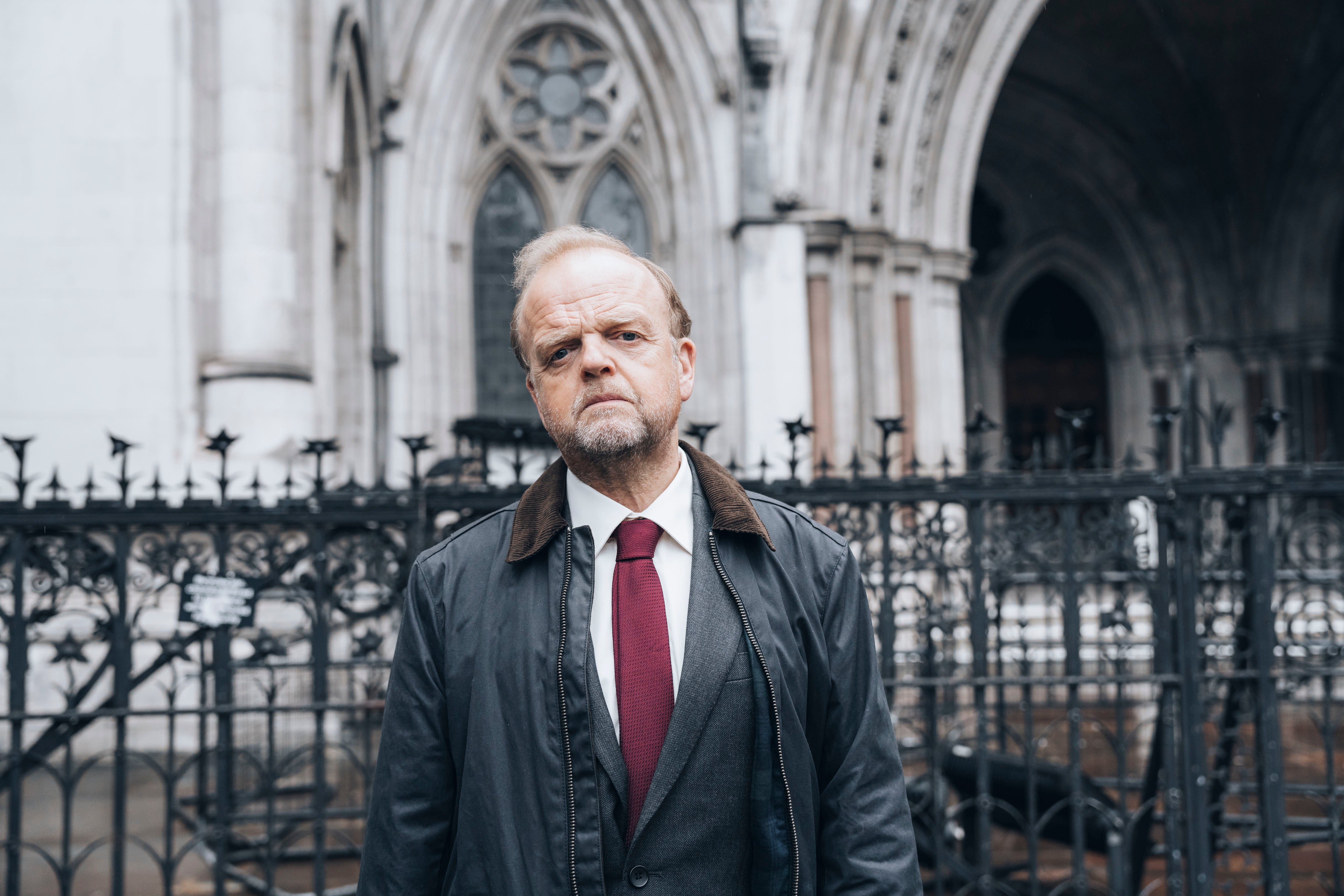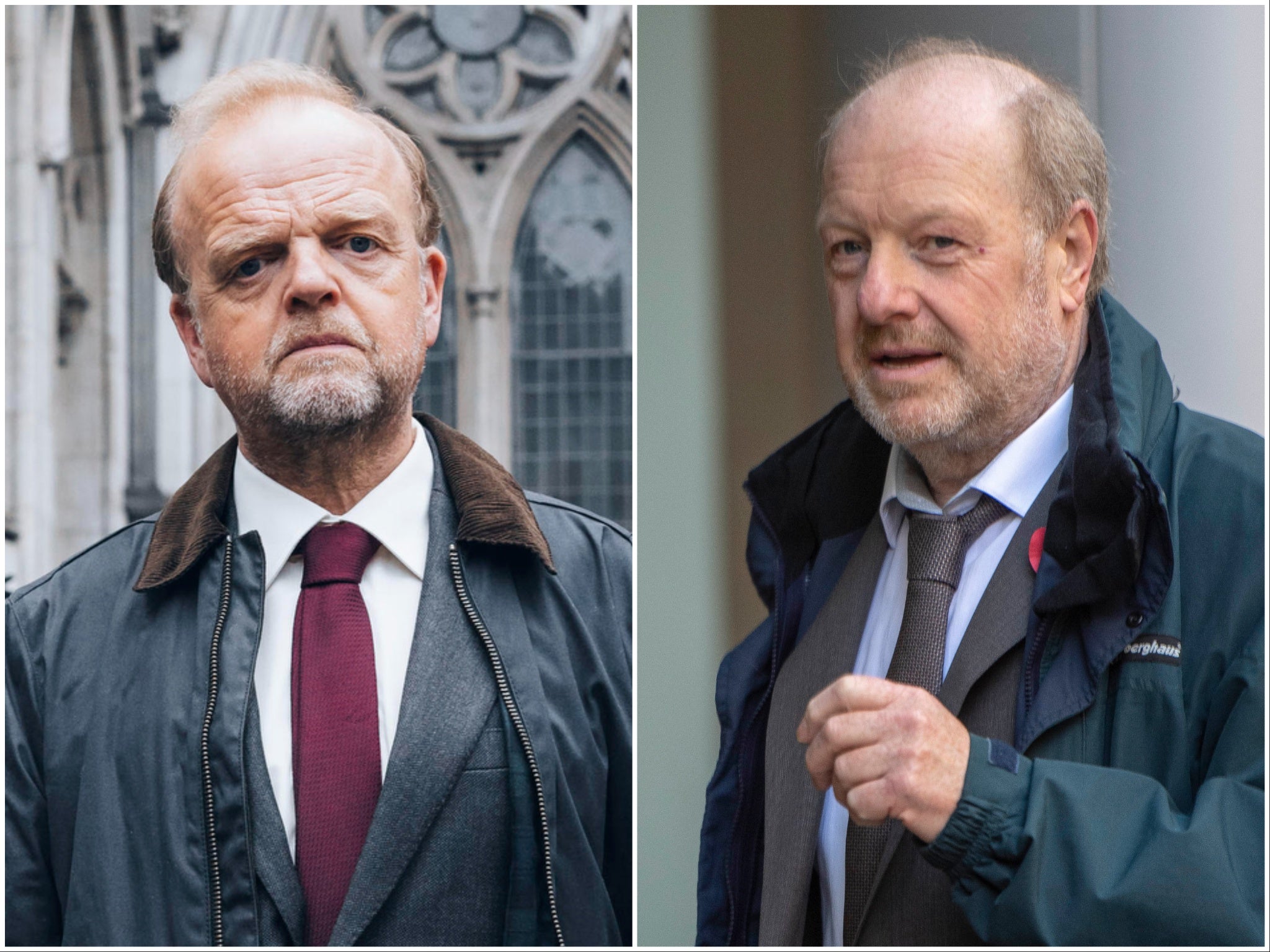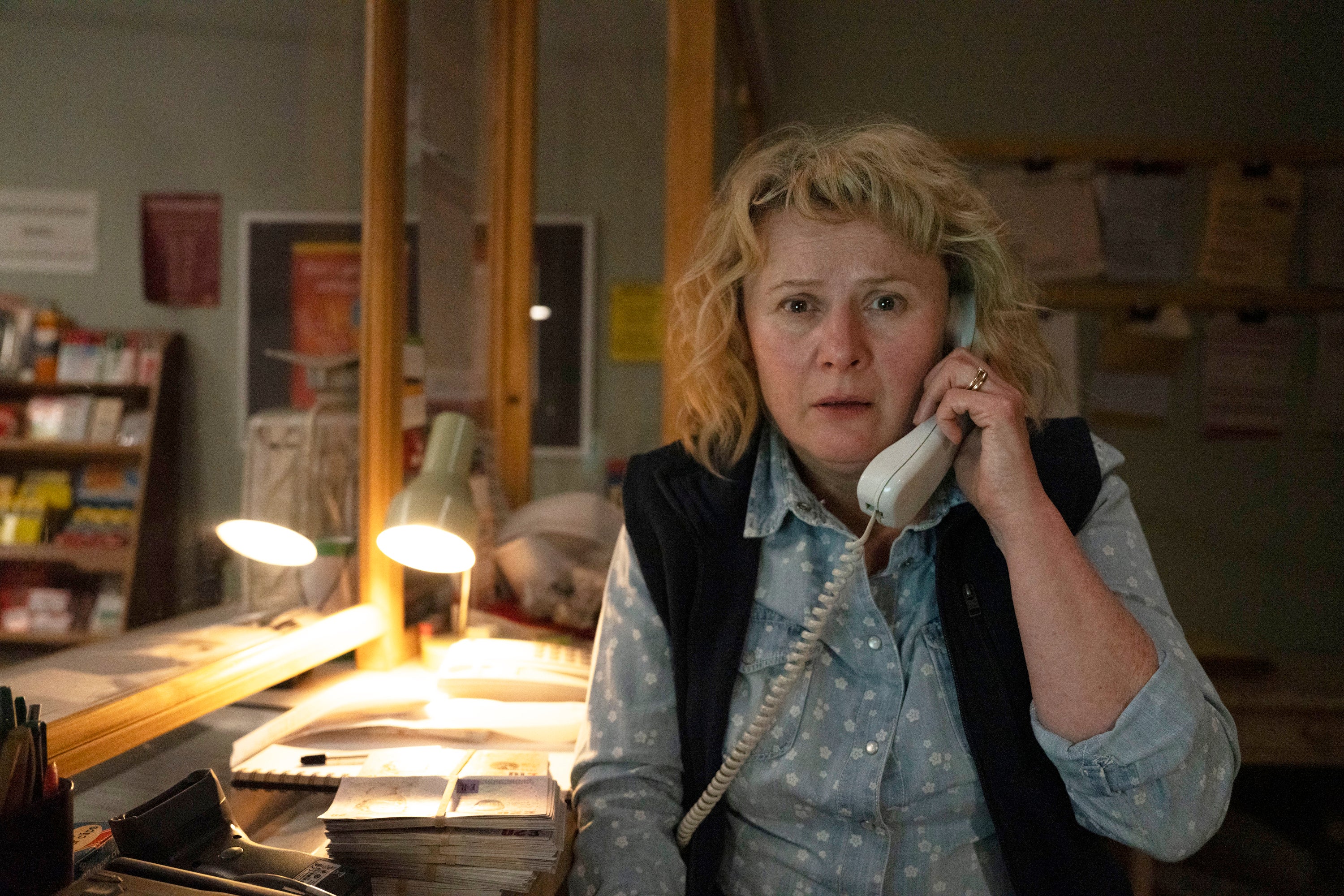‘We all secretly think they’re spinning it out so everyone dies before they get their money’: Inside Mr Bates vs the Post Office
The series stars Toby Jones as subpostmaster Alan Bates, the man who led the fight to hold the Post Office to account after one of the greatest miscarriages of justice in British legal history. Ellie Harrison hears from the cast and crew about how it was made


It’s odd, because everyone thinks of the Post Office as warm and cuddly,” says one bemused reporter in ITV’s new drama Mr Bates vs the Post Office. It’s true – the red and white oval logo brings to mind Postman Pat and handwritten Christmas cards from your gran. The series, though, which dramatises one of the greatest miscarriages of justice in British legal history, paints a very different image of the national institution.
Alan Bates, played by a superb, scruffy Toby Jones, is the Mr of the title – a man who has spent two decades of his life fighting for justice after hundreds of postmasters and postmistresses were accused of theft, fraud, and false accounting – all because of faulty computers. In 1999, Horizon, a defective Fujitsu IT system, began incorrectly reporting cash shortfalls at branches across the country. The accusations tore people’s lives apart, with many losing their jobs and homes. Several people took their own lives due to the stress. To this day, not a single Post Office or Fujitsu employee has been held to account over the scandal, much less faced criminal investigation. And 60 of the victims have died before finding any justice at all.
It’s an extraordinary story of mass gaslighting. Subpostmasters, who had watched helplessly as balances inexplicably changed before their eyes, were told repeatedly by the Post Office that no one else was having any problems with the computer system. It’s also a story of shameless cover-ups and incredible human resilience. On paper, it’s a real-life case ripe for adaptation – and yet many people have never heard of it – presumably because it’s so pedestrian. So unglamorous. “To my shame, I didn’t know very much about this [before making the show],” says Jones, at a screening for the series. “There was some part of my brain when it got to that part of the news, that switched off. Fraud is quite hard to understand beyond the headlines. And then there’s something by definition about postmasters and postmistresses that is unshowy, unflashy, citizenry.”
The show’s director James Strong believes that the everydayness of the story is one of its biggest strengths. Ordinary men and women – many of whom had worked at the Post Office for decades and lived quiet, respectable lives – suddenly found themselves local pariahs or behind bars. “The series is celebrating these amazing people who perhaps don’t always get seen on television,” he says. “It’s usually always policemen and bodies and murders, but this is a drama about real people. One of my favourite scenes is of Monica Dolan [who plays postmistress Jo] and her mum and husband talking about remortgaging. That’s not something you always see on TV, yet it is compelling.”
Strong jumped at the opportunity to work on the drama because, he says, it’s “live and still happening”. While there was a landmark Court of Appeal decision in 2021 to overturn the post workers’ criminal convictions, with dozens of former subpostmasters and postmistresses being exonerated on all counts, the fight for compensation is continuing and there is an ongoing inquiry. Screenwriter Gwyneth Hughes – who also made the searing 2018 modern slavery drama Doing Money – says she thinks the company “is just spinning it out so that everybody dies before they can get their money”.
Hughes describes Bates as an “unassuming bloke who ran an unassuming post office in the seaside resort of Llandudno. Likes a beer. Doesn’t like cauliflower. Uncomfortable with being asked about his ‘feelings’. Bone-dry sense of humour, and a twinkle in his eye”. He didn’t, she adds, “ask to spend years of his life in a war against halfwits, expensive lawyers, and the British government. But here he still is, extraordinary, indomitable, a true British hero. I’ve been so proud to write his story.” Jones, meanwhile, says it was a joy to play him. At the screening, with Bates in attendance, the actor pays tribute to his “his doggedness, his determination and his sheer intelligence”.
Bates started his mission in 2003, after being blamed for mysterious accounting shortfalls at his own Post Office. After losing his job, he set up a website where whistleblowers could share their stories and began hosting get-togethers for fellow victims at a village hall. Over the years, more and more people trickled in through the doors. In 2018, Bates and five others took the Post Office to the High Court in a group litigation order covering 555 claimants. The judge ruled computer errors were to blame, and in December 2019, the Post Office agreed to pay £57.75m in compensation for false prosecutions based on faulty evidence from the Horizon system. After legal costs, Bates’s group were left with only £12m between them – about £20,000 for each claimant.

In March 2022, a compensation scheme was set up by the government for victims to apply to. But Bates told The Mirror last December: “My understanding is that not one person in the scheme has received their full and final financial redress. This has been a total cover-up; there has been no end to the lies. I just hope that the real guilty are actually pursued and prosecuted.”
Another person who was instrumental in Bates’s campaign is Jo Hamilton, who was accused of stealing £36,000. In the series, she is played by Dolan – TV’s queen of angst, who recently stole scenes with her nervy performance in another ITV real-life drama, The Thief, His Wife and the Canoe. Here, she depicts Hamilton as a woman at the total mercy of these strange Horizon computers, which sit like blinking monsters below the counter.

Watch Apple TV+ free for 7 day
New subscribers only. £9.99/mo. after free trial. Plan auto-renews until cancelled.
ADVERTISEMENT. If you sign up to this service we will earn commission. This revenue helps to fund journalism across The Independent.

Watch Apple TV+ free for 7 day
New subscribers only. £9.99/mo. after free trial. Plan auto-renews until cancelled.
ADVERTISEMENT. If you sign up to this service we will earn commission. This revenue helps to fund journalism across The Independent.
Dolan says that Hamilton was “very inclined to blame herself” for the shortfalls because the computer system was new when she started working at the Post Office. “Now, we know that there are bits and bobs wrong with computers, but at that time [in the early 2000s], they were God, and everyone just thought the computer must be right,” she says. “So, it took having to remortgage the house before being able to talk to family about it, because if you’re on your own, and you think it’s something that you’re not doing or something wrong with you, there’s a lot of shame attached to that.”

While Jones and Dolan built relationships with the real people behind their characters, their co-stars who were playing Post Office executives had no such luck. Lia Williams was tasked with portraying Paula Vennells, the Post Office’s chief executive for much of the period during which the postmasters were wrongly accused. She commissioned internal reports that found the Post Office may have prosecuted innocent people and that the IT system was faulty, and yet she kept those findings to herself. Unsurprisingly, she didn’t fancy cooperating with the ITV drama.
“It was really difficult with Paula,” says Williams, “because we don’t know a great deal about her.” The role of Vennells is made up of key headline facts – including the incongruous detail that she’s an Anglican minister. According to Hughes, her script was “literally culled from emails she wrote someone, the transcripts of the famous select committee hearing, the odd broadcast, and some letters”. “It was one of the hardest things I’ve had to do as an actor, to be honest,” says Williams, “because it’s literally a transcript that I had to try to make fit in my mouth and sound natural, but she’s kind of a strange lady anyway, so it probably worked really well. To play any role, you have to step inside and try to seek out the humanity in them, but we had quite little to go on.”
I wanted to reflect their complete humanity, not just their victimhood
This is not a story short on misery – and therefore not typical New Year’s Day viewing. But Hughes has injected moments of lightness where she can. Julie Hesmondhalgh, who plays Bates’s partner Suzanne Sercombe, is a highlight. Not only is she his rock – though she’d rather their spare room was full of her sewing machines rather than boxes of evidence – she is also the show’s comic relief. “You can piss right off,’” she says, her mouth full of biscuit and flipping her middle finger, as she watches Vennells on the telly.
“It’s about leavening the horror to make the audience not go away,” says Hughes. “But the more important issue is about evoking these people in a deeper and truer way, because each one of them has retained their sense of humour, and they’re all just funny company. And yes, they’re victims of hideous ongoing miscarriages of justice, but they’re also still there. Each one of them is still there, still an individual, still living a life that’s worth having, and into which they have very hospitably allowed me to slot myself. So, I wanted to reflect their complete humanity, not just their victimhood.”
Hughes is clearly upset by the lack of justice. “It’s just madness,” she says. “The Post Office are going out of their way to make it impossible to resolve. I mean, they’ve got multiple compensation schemes that are all incredibly complicated and difficult.”
“What are they doing?” asks Jones. “What makes people feel more loyalty to a brand, than they do to victims who are dying?” He sighs, exasperated. “It’s mysterious.”
‘Mr Bates vs the Post Office’ begins on ITV at 9pm on Monday 1 January
Join our commenting forum
Join thought-provoking conversations, follow other Independent readers and see their replies
Comments
Bookmark popover
Removed from bookmarks